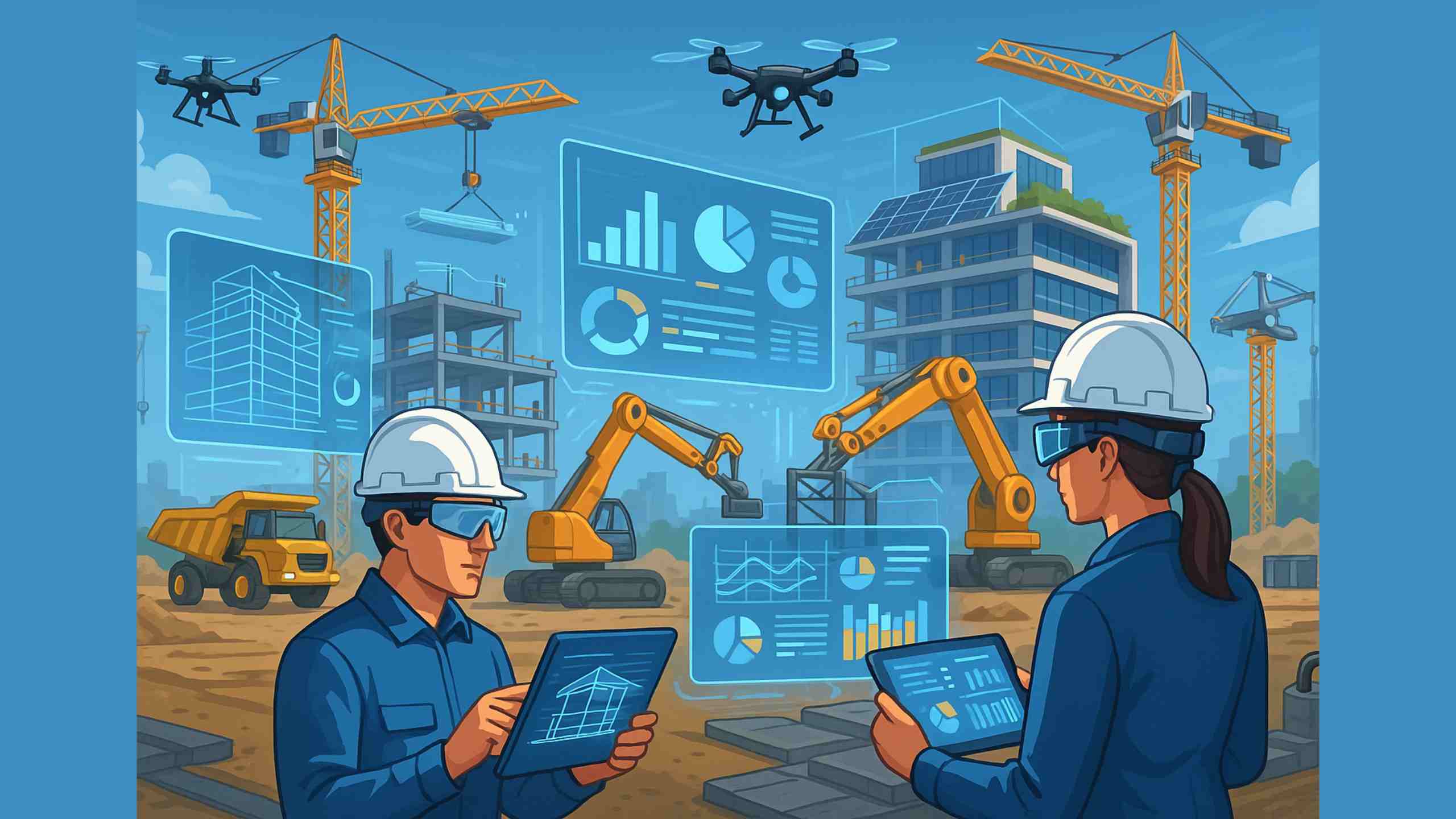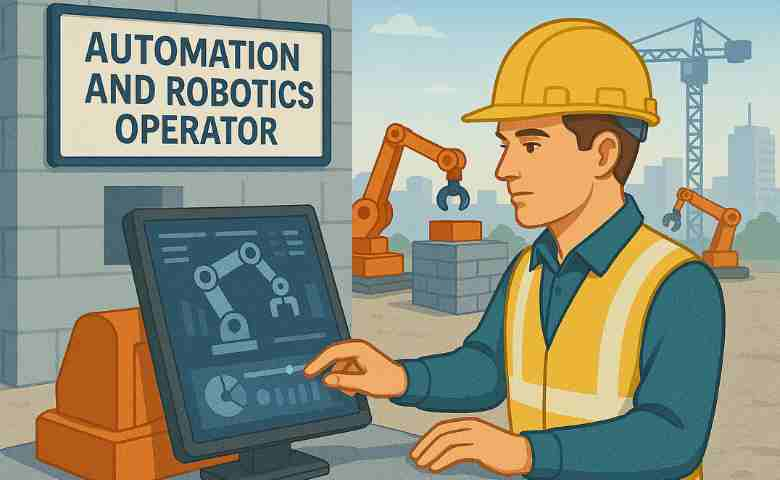Last Updated on April 4, 2025 by Admin
Welcome to the exciting intersection of construction and technology! In an era defined by digital transformation, even the age-old construction industry is not immune. Traditional brick-and-mortar processes are being reshaped by technology, opening up an array of promising careers in construction technology integration.
ConstructionCareerHub App is LIVE — built ONLY for construction careers. Don’t apply with a weak resume.
Get ATS-ready Resume Lab + Interview Copilot + Campus Placement Prep (resume screening, skill gaps, interview readiness) — in minutes & Other advanced features.
Explore Smarter Construction Career Tools →Quick check. Big impact. Start now.
In this comprehensive guide, we’ll take you on a journey through this dynamic landscape. We’ll explore the roles and salary expectations in building construction technology jobs, shed light on the areas of specialization in building technology, and provide a list of careers in construction. You’ll get a peek into what it’s like to work in this industry, whether a building construction technology degree is right for you, and how lucrative this career path can be.
Table of Contents
Whether you’re a job seeker, a civil engineering enthusiast, or someone who’s always been fascinated by the blend of construction and technology, this guide is your comprehensive ticket to understanding what the future of construction looks like. So, strap in as we dive into the fascinating world of construction technology integration.
Understanding Building Technology Integration
Before we dive into the nitty-gritty of careers, let’s first decode the phrase “building technology integration”. It refers to the convergence of traditional construction methods with advanced technological solutions, making construction processes more efficient, sustainable, and safe. With increasing reliance on data analysis, automation, robotics, and other technologies, the construction industry is more technologically-driven than ever before.
Building technology, at its heart, is about designing, planning, and managing the construction and infrastructure of buildings. The work of building technology includes everything from maintaining HVAC systems to designing energy-efficient buildings, and a lot more.
Related Posts:
- Smart Building Solutions: Enhancing Security and Safety in Commercial Buildings
- The Evolution of Office Spaces: What Does the Future Hold?
- The Evolution Of Smart Tech In Modern Homes
- Blending GIS & BIM: A Novel Approach In Infrastructure Development
Emerging Careers and Job Roles in Construction Technology Integration
The integration of advanced technologies in the construction industry has led to the emergence of several new career paths. Here are some of the top emerging roles in construction technology integration.
1. Construction Technologist:
The roles of a Construction technologist is responsible for managing and implementing a company’s construction technology stack, ensuring that technological tools and processes are effectively integrated into construction projects.

2. Building Information Modeling (BIM) Manager/Coordinator:
BIM Coordinator Oversees the development and management of digital representations of physical and functional characteristics of places, facilitating better decision-making throughout the building lifecycle.

3. Digital Twin Specialist:
The Digital Twin specialist creates and manages digital replicas of physical assets to monitor and optimize their performance, enhancing project efficiency and predictive maintenance.

4. 3D Printing Technician:
Operates and maintains 3D printing equipment used for constructing building components, contributing to innovative construction methods and material efficiency.

5. Drone Operator/Surveyor:
Drone operation: Utilizes drones for aerial surveying, site monitoring, and data collection, providing accurate and real-time insights for construction projects.

6. Sustainability Consultant/Green Building Expert:
Sustainability consultant Advises on eco-friendly building practices and ensures projects comply with environmental regulations, promoting sustainable construction methods.

7. Construction Data Analyst:
Construction data analysts analyze construction data from various construction processes to inform decision-making, improve efficiency, and predict project outcomes.

8. Automation and Robotics Operator:
Manages and maintains robotic systems and automated machinery used in construction, enhancing productivity and safety on-site.

9. Computational Engineer:
Develops algorithms and scripts to analyze building models, ensuring compliance with codes and optimizing design processes.

10. Cybersecurity Engineer:
Protect construction technology systems from cyber threats, ensuring the integrity and security of digital tools and data.
These roles reflect the industry’s shift towards digitalization and the growing importance of technology in modern construction practices.

Why Building Technology is a Good Course
So, is building technology a good course to pursue? The short answer is a resounding yes. As we move towards a more digital future, the demand for professionals adept in both construction principles and technology integration is growing exponentially. A degree in building construction technology not only equips students with the requisite technical knowledge but also prepares them for the future of construction.
Moreover, having a building construction technology degree opens doors to a wide array of roles, from construction project managers and building inspectors to construction estimators and site engineers. This leads us to our next big question: what are the salaries for building construction technology jobs?
Building Construction Technology Jobs Salary
Salaries in the construction technology sector vary based on job role, experience, location, and other factors. Below is an overview of average annual salaries for various positions within this field in the United States:
- Construction Technologist: Approximately $90,897 per year, with an average base salary of $72,850.
- Building Information Modeling (BIM) Specialist: Average salary of $78,000 in 2023, with an expected increase to $83,000 in 2024.
- Construction Technology Specialist: Estimated total pay around $138,381 annually, with a base salary of $85,414.
- Civil Engineering Technologist/Technician: Median annual wage of $60,700 as of May 2023.
- Construction Technician: Average salary of $40,475 per year, with a typical range between $28,000 and $57,000.
- Construction Engineering Technician: Average annual salary of $62,977, equating to approximately $30.28 per hour.
- Instrumentation Technician: Average annual salary of $84,760.
- Surveyor: Average annual salary of $79,840.
- Mobile Crane Operator: Average annual salary of $80,674.
- General Foreman: Average annual salary of $89,609.
These figures are averages and can fluctuate based on factors such as geographic location, level of experience, education, certifications, and the specific employer. Additionally, salaries in the construction technology sector may evolve over time due to industry demand, technological advancements, and economic conditions.
Areas of Specialization in Building Technology
Now that we’ve understood what building technology is and the potential earnings, let’s explore the areas of specialization in building technology.
- Building Information Modeling (BIM): BIM is a digital representation of the physical and functional characteristics of a facility. It’s not just a trend; it’s the future of construction management.
- Green Building Technology: With sustainability at the forefront, green building professionals focus on creating energy-efficient buildings and infrastructure.
- Construction Project Management: This field is perfect for those who love overseeing all elements of a construction project, from planning to execution.
- Structural Engineering Technology: This specialization involves designing and analyzing structures like bridges, buildings, and tunnels.
- HVAC Technology: In this field, professionals ensure that the heating, ventilation, and air conditioning systems of a building work efficiently.
Remember, each specialization comes with its own set of challenges and rewards. You can find a comprehensive list of careers in construction and their specific roles at this link. .
Paving Your Way: How to Get Started
Armed with a degree and an area of specialization, the next step is to venture into the job market. If you’re fresh out of college, internships and entry-level jobs will be your stepping stone. If you’re switching careers, leveraging your previous experience and newly acquired skills can make you a valuable asset.
Networking is another essential aspect. Join relevant professional networks like the Associated General Contractors of America (AGC), attend industry events, and don’t shy away from connecting with industry professionals on LinkedIn.
The Digital Transformation in Construction
The construction industry is undergoing a digital revolution. Companies are increasingly integrating technologies like Artificial Intelligence (AI), the Internet of Things (IoT), and Augmented Reality (AR) into their practices. Whether it’s autonomous machinery for on-site work or digital twins for effective project management, the innovative use of these technologies is reshaping the construction landscape.
Take a look at this Harvard Business Review article on how technology is disrupting the construction industry for deeper insights into this transformation.
Essential Skills for Careers in Construction Technology Integration
While a degree and knowledge of construction technology are essential, certain soft skills can enhance your career prospects in this field:
- Analytical Skills: Construction tech professionals need to analyze data and make informed decisions. This is especially relevant in roles related to BIM or IoT.
- Project Management Skills: Whether it’s adhering to deadlines or managing resources, project management skills are essential in construction.
- Communication Skills: You’ll be required to coordinate with diverse teams. Effective communication facilitates smoother operations and prevents misunderstandings.
- Adaptability: With the rapid pace of technological advancements, being adaptable is crucial. Professionals must stay updated and be willing to learn new tools and technologies.
To brush up on these skills, you might want to consider courses on platforms like Coursera or Udemy.
Educational Pathways to Careers in Construction Technology Integration
To pursue a career in construction technology integration, you would typically need a bachelor’s degree in a related field like construction engineering, civil engineering, construction management, or building science. Many universities offer courses specifically in building technology, providing comprehensive knowledge of construction processes, materials, systems, and technologies.
For those interested in advanced roles or specializations, pursuing a master’s degree or a PhD can be beneficial. Online platforms like edX offer courses from top-tier universities that can be pursued remotely and at your own pace.
Importance of Certifications
Certifications can significantly enhance your career prospects in construction technology integration. They not only validate your skills but also demonstrate your commitment to professional development. A few sought-after certifications in this field include:
- Certified Construction Manager (CCM): Offered by the Construction Management Association of America (CMAA), this certification is the gold standard in construction management.
- LEED Green Associate: This certification, offered by the U.S. Green Building Council, is ideal for professionals interested in sustainable construction practices.
- Autodesk Certified Professional: Revit for Architectural Design: This certification demonstrates proficiency in using BIM software for architectural design.
Many of these certifications require continuing education, which ensures that professionals stay updated with the latest industry trends and technologies.
The Impact of Emerging Technologies
In the context of future job opportunities, it’s crucial to keep an eye on emerging technologies in the construction industry. Technologies like 3D printing, virtual reality (VR), and drones are becoming increasingly prevalent.
For instance, 3D printing allows for rapid prototyping and even full-scale construction of structures, opening up new job opportunities in design and on-site execution. Similarly, VR technology is becoming a popular tool for visualizing architectural designs and conducting virtual site tours, creating demand for professionals skilled in these areas.
Keeping abreast of these trends not only ensures you’re prepared for the future job market but also helps identify areas where you might want to gain expertise.
Professional Associations and Networking
Joining professional associations can provide invaluable networking opportunities and access to resources. Organizations like the Associated General Contractors of America or the Construction Management Association of America offer professional development programs, industry updates, and opportunities to connect with industry leaders.
Remember, networking plays a significant role in career advancement. Participating in industry conferences, webinars, and workshops can help you forge connections that may open doors to new opportunities.
With a broad understanding of what construction technology integration entails and armed with the right skills and mindset, you are now well-prepared to make your mark in this exciting field. There’s a world full of opportunities waiting for you in the era of digital construction. Are you ready to build your future?
The Future of Careers in Construction Technology Integration
The integration of technology in construction is not just a phase; it’s here to stay. With advancements in AI, robotics, and sustainable practices, the future of construction technology integration looks promising. Hence, careers in this field will continue to be in high demand, making it an ideal choice for those seeking a rewarding and progressive career path.
With the right mix of technical expertise and soft skills, careers in construction technology integration can indeed prove to be lucrative and satisfying. So, whether you’re contemplating pursuing a degree in building technology or looking to switch careers, the world of construction technology integration awaits you.
Are you ready to build your future? For more insights into the construction industry and job placements, visit www.constructionplacements.com. From the latest news to job openings, it’s your one-stop platform for everything related to building and construction careers.
Your future in the world of construction technology integration is waiting for you. Are you ready to seize it?
Final Thoughts
The construction industry is evolving, and with it, careers in construction technology integration are becoming more significant and diverse. The convergence of traditional construction techniques and advanced technology is paving the way for a new era of innovation and efficiency in the industry. By pursuing a degree in building technology, gaining valuable certifications, honing essential soft skills, and staying abreast of emerging trends, you are setting yourself up for a successful and rewarding career in this field. The future of construction technology integration is full of potential. Are you ready to be a part of it?
FAQs
What kind of education is required for a career in construction technology integration?
For a career in construction technology integration, a bachelor’s degree in construction engineering, civil engineering, construction management, or building science is generally required. Advanced roles may benefit from a master’s degree or PhD in a specialized area of construction technology.
Are certifications important in the field of construction technology integration?
Certifications such as Certified Construction Manager (CCM) or LEED Green Associate are crucial in the construction technology integration field. They validate skills and demonstrate a dedication to professional growth, enhancing career prospects.
How can emerging technologies impact future job opportunities in construction technology integration?
Emerging technologies like 3D printing, virtual reality, and drones are expanding job opportunities in construction. Keeping abreast of these technologies helps professionals prepare for and excel in the evolving job market.
How can I network in the construction industry?
Networking can be effectively achieved by joining professional associations such as the Associated General Contractors of America or the Construction Management Association of America. Attending industry conferences, webinars, and workshops also offers excellent opportunities to connect with peers and leaders in the field.
Related Posts:
- All you need to know about Apprenticeship in Construction [2025 Updated Guide]
- An Overview of Construction Equipment Rental Business in India
- How to Decide Which Job is the Best for You in India
- Civil Engineering Careers Blueprint eBook – The Great Construction Career
- 51 Top AutoCAD Interview Questions and Answers [2025 Updated]
- Navigating the Path: Choosing the Right Specialization for Your Master’s Degree
- Indian construction chemical and Waterproofing Market- An Overview
- Free Job Posting Sites In India and Job Portals [2025 Updated List]
- Emerging Careers in the Construction Industry in the Age of AI
- Engineering Ethics in Engineering Education
- Civil Engineering Vs Mechanical Engineering: Major Differences
- What Qualifications Do I Need to Work in Construction?
- Comprehensive List of Careers in Building Technology: A Guide for Aspiring Professionals
- Free Online Building Material Subject Practice and Preparation Test
- Mechanical Engineering Subjects | Mechanical Engineering Syllabus For BE, B.Tech Course
- Crafting the Perfect Civil Engineering Resume: Sample Formats, Tips, and Examples


